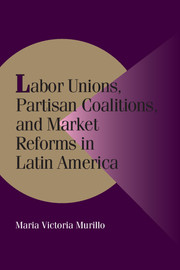Book contents
- Frontmatter
- Contents
- Abstract
- Acknowledgments
- List of Acronyms
- 1 UNIONS' DILEMMA: HOW TO SURVIVE NEOLIBERALISM
- 2 A THEORY OF UNION-GOVERNMENT INTERACTIONS
- 3 THE POPULIST PAST AND ITS INSTITUTIONAL LEGACIES
- 4 A TUG OF WAR: LABOR UNIONS AND MARKET REFORMS IN VENEZUELA
- 5 DIVIDED WE RULE: LABOR UNIONS AND MARKET REFORMS IN MEXICO
- 6 FROM PICKETS TO PRICES: LABOR UNIONS AND MARKET REFORMS IN ARGENTINA
- 7 MULTILEVEL COMPARISON
- 8 LABOR COMPETITION AND PARTISAN COALITIONS
- Bibliography
- Interviews
- Index
- Titles in the series
1 - UNIONS' DILEMMA: HOW TO SURVIVE NEOLIBERALISM
Published online by Cambridge University Press: 05 February 2010
- Frontmatter
- Contents
- Abstract
- Acknowledgments
- List of Acronyms
- 1 UNIONS' DILEMMA: HOW TO SURVIVE NEOLIBERALISM
- 2 A THEORY OF UNION-GOVERNMENT INTERACTIONS
- 3 THE POPULIST PAST AND ITS INSTITUTIONAL LEGACIES
- 4 A TUG OF WAR: LABOR UNIONS AND MARKET REFORMS IN VENEZUELA
- 5 DIVIDED WE RULE: LABOR UNIONS AND MARKET REFORMS IN MEXICO
- 6 FROM PICKETS TO PRICES: LABOR UNIONS AND MARKET REFORMS IN ARGENTINA
- 7 MULTILEVEL COMPARISON
- 8 LABOR COMPETITION AND PARTISAN COALITIONS
- Bibliography
- Interviews
- Index
- Titles in the series
Summary
As all the starts shrivel in the single sun,
The words are many, but The Word is one
that becomes uncoded later, with an exchange of capital letters:
The words are many, but the word is One.
Jorge Luis Borges (1932)In less than seven months, three men named Carlos assumed the presidencies in Mexico, Venezuela, and Argentina and produced the most important policy turnaround of the postwar era in these three countries. In December 1988, Carlos Salinas de Gortari from the Institutional Revolutionary Party (PRI) was inaugurated as president of Mexico. In February 1989, Carlos Andrés Pérez from the Social Democratic Party, Democratic Action (AD), started his term as president of Venezuela. In July 1989, Carlos Menem from the Peronist Party followed suit in Argentina. All three were the candidates of populist labor-based parties, which had supported protectionism and state intervention in the postwar period. Once in office, however, all three presidents actually reduced state intervention and opened their economies, thus moving their labor-based parties away from the policies upon which the historic relationship with their long-term labor allies had been built.
Because these three countries had labor-based parties in power and corporatist labor regulations, the common strain created by their parallel convergence into neoliberalism should have provoked a uniform reaction among labor unions according to the conventional wisdom. However, the patterns of union-government interactions in Argentina, Mexico, and Venezuela varied not only across the three countries, but also within them.
- Type
- Chapter
- Information
- Publisher: Cambridge University PressPrint publication year: 2001



